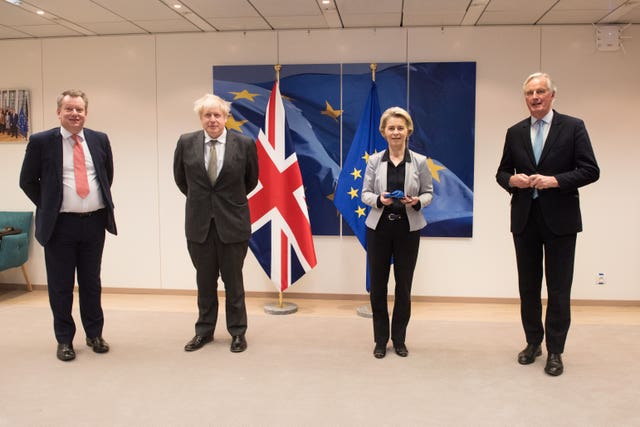
Iain Dale 7pm - 10pm
10 December 2020, 17:34

A meeting between Boris Johnson and Ursula von der Leyen paved the way for more negotiations but there was little sign of a breakthrough.
It will be “difficult” to reach a post-Brexit trade agreement, the European Union’s top official said as she stepped up no-deal planning.
Ursula von der Leyen set out plans for emergency legal agreements to keep planes flying to the UK and lorries crossing Europe the day after a dinner with Boris Johnson failed to produce a decisive breakthrough.
The European Commission president and the Prime Minister have agreed that a decision on the future of the negotiations will be taken by the end of the weekend.
The EU set out proposals for contingency agreements if a trade deal is not in place when the current arrangements expire at the end of the month, including on air routes, aviation safety and road transport.
One of the four measures proposed by Mrs von der Leyen is for EU fishing boats to continue to enjoy access to UK waters during 2021, an area which has been one of the main sticking points in the trade negotiations.
At a summit of EU leaders on Thursday, Mrs von der Leyen said: “I had a very long conversation yesterday night with Prime Minister Boris Johnson.
“It was a good conversation but it is difficult. We are willing to grant access to the single market to our British friends – it is the largest single market in the world.
“But the conditions have to be fair. They have to be fair for our workers and for our companies, and this fine balance of fairness has not been achieved so far.”
In response to the EU’s proposals, Downing Street again stressed the importance of taking back control of the UK’s waters.
The Prime Minister’s official spokesman said: “We would never accept arrangements and access to UK fishing waters which are incompatible with our status as an independent coastal state.”
But the spokesman said the UK will “look closely” at the mini-deals proposed by the EU if there is no overall agreement.
The EU’s leaders were being updated by Mrs von der Leyen on the progress – or lack of it – during the summit in Brussels.
Negotiations are still ongoing but the end of the transition is near. There is no guarantee that if & when an agreement is found it can enter into force on time. We have to be prepared including for not having a deal in place on 1 January. Today we present contingency measures ⤵️ pic.twitter.com/FQ4Urn9YUC
— Ursula von der Leyen (@vonderleyen) December 10, 2020
The fact that negotiators Lord Frost and Michel Barnier were meeting again on Thursday at least gave some cause for hope.
Ireland’s premier, Micheal Martin, said an agreement is “within reach”.
“It makes sense to get a trade deal. I’m very aware of the difficulties around a level playing field, the dispute resolution mechanism and fisheries,” he said as he arrived at the summit.
“I didn’t expect a breakthrough last evening. I think the fact that they met for quite a lengthy period of time and that frank exchange of views in itself is a good thing, and the fact that the negotiators are mandated to go back in again and try to break the logjam.”
But Sweden’s prime minister, Stefan Lofven, was “gloomy”, saying “As far as I can hear there is no progress made in the recent days.”
Lithuania’s president, Gitanas Nauseda, said the EU needs to be ready to put no-deal plans in place “from the first minute” on January 1.
The UK has not ruled out the prospect of talks continuing beyond Sunday, but ministers stressed the need for “finality” in the process.
Foreign Secretary Dominic Raab said it is “unlikely” that talks will continue after that deadline, “but I can’t categorically exclude it”.
Penny Mordaunt, a minister in the Cabinet Office, said the UK will continue negotiating until the last.
“We will carry on negotiating in talks until there is no hope of that happening, but at the moment there is hope of that happening, even though things do appear gloomy,” she told MPs.

Negotiations have faltered over fishing rights, the level playing field – measures aimed at preventing the UK undercutting the EU on standards and state subsidies – and the way that any deal would be governed.
Mr Raab said the UK has already moved in agreeing to a transition period to allow European trawlermen to adjust to changes in fishing rights, but argued that the EU is asking too much when it comes to level playing field arrangements.
The UK has condemned EU demands for punitive measures to be imposed if either side fails to follow the other in new rules governing areas including environmental protections and workers’ rights.
“What we’re not going to be treated is in a way that no other country would accept, and nor would the EU accept,” Mr Raab told BBC Radio 4’s Today programme.
“It’s about some basic respect for democratic principles.”
The Office for Budget Responsibility has suggested that a no-deal outcome could wipe 2% off gross domestic product, a measure of the size of the economy, in 2021 – which experts have indicated could be around £45 billion.
As stock markets in Europe closed the pound was down 1.18% against the euro and down 0.84% against the dollar, with traders nervous as time for a deal to be agreed slipped away.